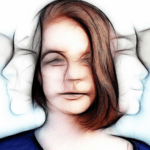
Mood Disorders
August 17, 2024
Personality Disorders
August 17, 2024Do you find yourself constantly checking if the door is locked or washing your hands repeatedly until they are raw? You may be familiar with these behaviors, which are common in anxiety disorders, but do you know what lies behind them? Let’s explore the complex world of Obsessive-Compulsive Disorder (OCD) and unravel its mysteries. Join us as we explore the ins and outs of OCD to gain a deeper understanding of this often misunderstood condition.
Definition and Explanation of Obsessive-Compulsive Disorder
Obsessive-Compulsive Disorder (OCD) is a mental health condition characterized by intrusive thoughts, images, or urges that lead to repetitive behaviors. These obsessions can cause significant distress and anxiety, leading individuals to perform compulsions in an attempt to alleviate their discomfort.
People with OCD often experience a sense of powerlessness over their thoughts and actions, feeling trapped in a cycle of fear and compulsion. The rituals they engage in may provide temporary relief but ultimately reinforce the obsessive patterns. Therapies often include exposure and response prevention (ERP), which helps patients manage anxiety and disruptive symptoms through structured exposure to fears and effective coping strategies.
It’s important to understand that OCD is not simply about being overly tidy or organized; it goes much deeper than that. The disorder can significantly impact daily functioning, relationships, and overall quality of life for those affected.
Seeking professional help from qualified mental health providers is crucial for the proper diagnosis and treatment of OCD. Therapy approaches such as cognitive-behavioral therapy (CBT) and medication can be effective in managing symptoms and improving well-being.
Common Symptoms and Behaviors Associated With High-Functioning OCD
Obsessive-Compulsive Disorder (OCD) is characterized by a pattern of unwanted and intrusive thoughts, known as obsessions, that lead to repetitive behaviors or mental acts, called compulsions. These symptoms can vary widely among individuals but often revolve around certain themes like cleanliness, symmetry, or harm avoidance.
Common obsessions may include fears of contamination, doubts about safety or orderliness, aggressive impulses, or even unwanted taboo thoughts. Compulsions typically manifest as rituals aimed at reducing anxiety caused by the obsessions. Examples range from excessive hand washing, and checking locks multiple times to counting or repeating specific phrases silently.
Individuals with OCD often feel compelled to perform these rituals despite knowing they are irrational. The cycle of obsession and compulsion can become time-consuming and interfere with daily activities. Understanding these symptoms is crucial in recognizing when professional help might be needed for effective treatment strategies tailored to each individual’s unique experience with OCD.
Recognizing these symptoms is crucial for treating OCD effectively and tailoring treatment strategies to each individual’s unique experience.
Causes and Risk Factors for Developing OCD, Including OCD and Trauma
Obsessive-Compulsive Disorder (OCD) is a complex mental health condition that can be influenced by a variety of factors. While the exact cause of OCD is not fully understood, research suggests that a combination of genetic, environmental, and neurological elements may play a role in its development.
Genetic predisposition is believed to contribute to the likelihood of developing OCD. Studies have shown that individuals with a family history of OCD or related disorders may have an increased risk of experiencing symptoms themselves. Additionally, abnormalities in certain brain structures and neurotransmitter levels are thought to impact the onset of obsessive-compulsive behaviors.
Environmental stressors and traumatic experiences can also trigger or exacerbate OCD symptoms in susceptible individuals. High levels of stress, significant life changes, or exposure to traumatic events can all potentially contribute to the manifestation of obsessive thoughts and compulsive behaviors.
Furthermore, specific personality traits such as perfectionism or excessive need for control may increase vulnerability to developing OCD. These traits, coupled with environmental triggers, can create fertile ground for the disorder to take root and flourish. Understanding these potential causes and risk factors is crucial in addressing and managing OCD effectively for those affected by it.
Diagnosis and Treatment Options for OCD, Including Therapy and OCD Medication
Seeking a proper diagnosis of Obsessive-Compulsive Disorder (OCD) is crucial in determining the most effective treatment plan. A healthcare professional, typically a psychiatrist or psychologist, will conduct an evaluation to assess symptoms and behaviors associated with OCD. For some individuals, OCD residential treatment may be necessary to provide a supportive environment and intensive care.
Therapy, such as Cognitive Behavioral Therapy (CBT), is often recommended as a primary treatment option for managing OCD. CBT helps individuals identify and challenge negative thought patterns that contribute to obsessive thinking and compulsive behaviors. Seeking help from an OCD treatment center can provide specialized care tailored to the unique needs of each patient.
In some cases, medication may also be prescribed to help alleviate symptoms of OCD. Commonly used medications include selective serotonin reuptake inhibitors (SSRIs), which can help regulate neurotransmitters in the brain associated with OCD.
It’s important for individuals with OCD to work closely with their healthcare provider to find the right combination of therapy and medication that works best for them. Mental health treatment plans should be personalized to address each individual’s unique needs and circumstances. Specialized treatment options, beyond traditional CBT, can be highly effective in managing OCD symptoms.
Coping Mechanisms and Strategies for Managing OCD in Daily Life
Living with OCD can present daily challenges, but there are effective coping mechanisms to help manage symptoms. One strategy is practicing mindfulness, focusing on the present moment to reduce anxiety. Setting realistic goals and priorities can also provide structure and a sense of accomplishment.
Establishing a routine can create predictability and stability in day-to-day life. It’s important to communicate openly with loved ones about your struggles, as having a strong support system can make a significant difference. Engaging in regular physical activity not only benefits overall well-being but also helps alleviate stress associated with OCD.
Seeking professional help through therapy or counseling is crucial for developing personalized coping strategies. Remember that self-care is not selfish – taking time for yourself is essential for managing symptoms effectively. By implementing these strategies consistently, individuals with OCD can navigate their daily lives more smoothly and find relief from intrusive thoughts and compulsions.
Debunking Common Myths and Misconceptions About OCD
When it comes to Obsessive-Compulsive Disorder (OCD), there are numerous myths and misconceptions that often cloud people’s understanding of this mental health condition. One common myth is that OCD is just about being overly tidy or organized. In reality, OCD involves much more than just cleanliness – it encompasses intrusive thoughts and repetitive behaviors that can significantly impact a person’s daily life.
Another misconception is that individuals with OCD can simply “snap out of it” if they try hard enough. This couldn’t be further from the truth; OCD is a complex mental illness that requires professional treatment and support for effective management. Additionally, some may believe that everyone has a little bit of OCD in them, but true OCD goes beyond quirky habits or preferences.
Understanding the realities of OCD is crucial in order to provide empathy and support to those struggling with this disorder. By debunking these myths, we can foster a more compassionate and informed environment for individuals living with OCD.
The Importance of Seeking Help and Support for Those With OCD
Seeking help and support for those experiencing OCD is crucial in managing the disorder effectively. It’s important to remember that OCD is a real mental health condition that can significantly impact daily life if left untreated. Residential treatment can provide an intensive, supportive environment tailored to the unique needs of patients, allowing them to focus on their recovery without everyday distractions.
Reaching out for professional assistance, such as therapy or medication, can provide individuals with the tools and strategies needed to cope with their symptoms. Support from loved ones and peers can also play a vital role in the recovery process.
By seeking help early on, individuals with OCD can learn how to recognize triggers, develop healthy coping mechanisms, and improve their overall quality of life. Remember, it’s okay to ask for help – you don’t have to face OCD alone.
At First City Mental Health Center in Kokomo, Indiana, specialized care for OCD treatment is available to provide personalized support tailored to each individual’s needs. Don’t hesitate to reach out and take the first step towards healing and reclaiming control over your life.
Conclusion
Coping with Obsessive-Compulsive Disorder (OCD) can be challenging, but it is essential to remember that help and support are available. Understanding the nature of OCD, its symptoms, causes, and treatment options is crucial in managing the condition effectively. By seeking professional help at a specialized center like First City Mental Health Center in Kokomo, Indiana, individuals with OCD can receive tailored treatment plans to address their specific needs.
It’s important to debunk common myths surrounding OCD and promote awareness about the disorder. Education and destigmatization play key roles in creating a supportive environment for those living with OCD. Remember that seeking help is not a sign of weakness but a proactive step towards better mental health.
If you or someone you know is struggling with OCD symptoms, don’t hesitate to reach out to us in Kokomo, Indiana. With the right diagnosis, treatment approach, coping mechanisms, and support system in place, individuals can lead fulfilling lives despite having OCD. Let’s continue to prioritize understanding and destigmatizing mental health conditions like OCD for a more compassionate society overall.






